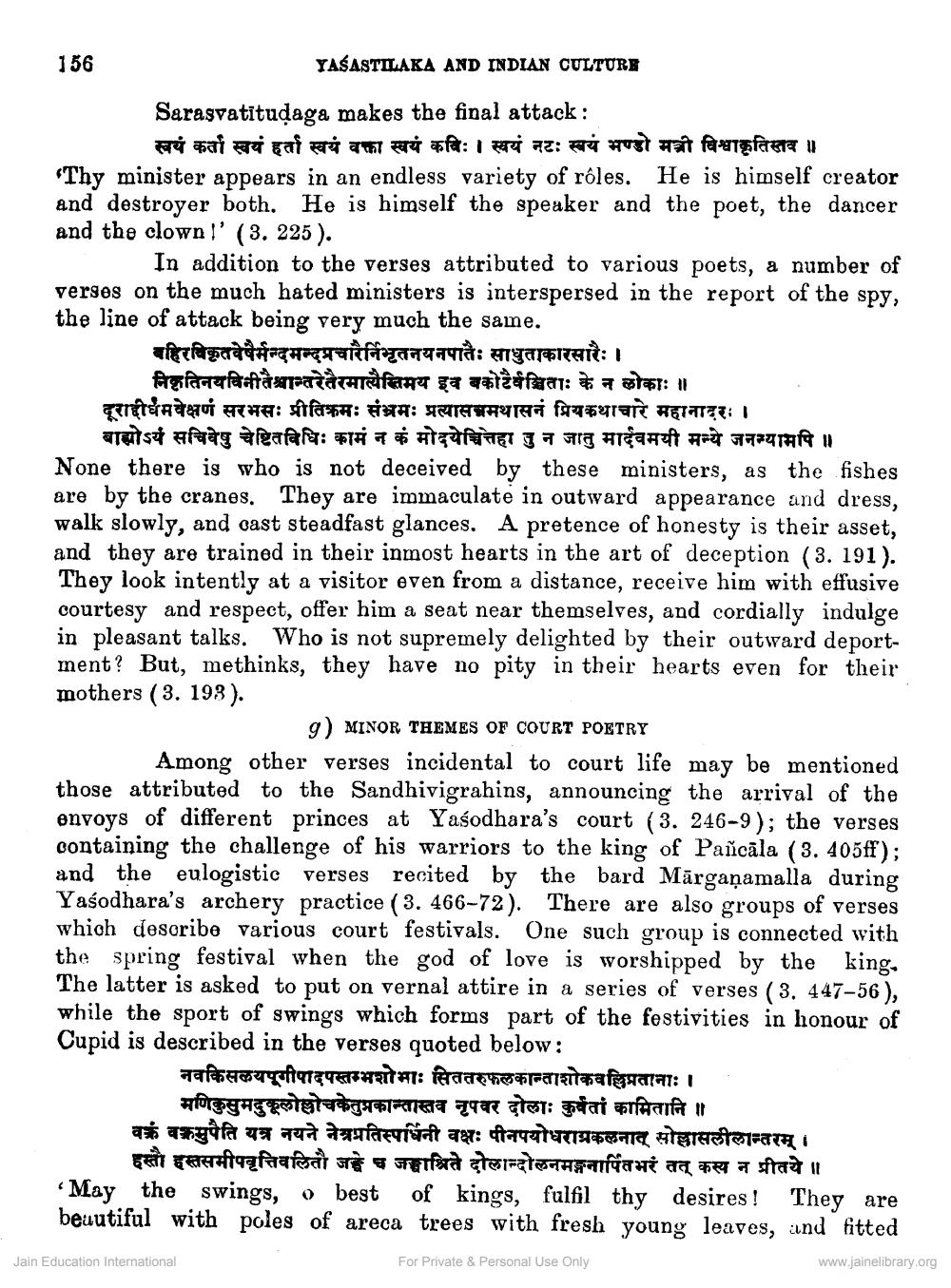________________
156
YASASTILAKA AND INDIAN CULTURE
Sarasvatituḍaga makes the final attack:
स्वयं कर्ता स्वयं हर्ता स्वयं वक्ता स्वयं कविः । स्वयं नटः स्वयं भण्डो मन्त्री विश्वाकृतिस्तव ॥ "Thy minister appears in an endless variety of rôles. He is himself creator and destroyer both. He is himself the speaker and the poet, the dancer and the clown!' (3. 225).
In addition to the verses attributed to various poets, a number of verses on the much hated ministers is interspersed in the report of the spy, the line of attack being very much the same.
बहिरविकृतवेषैर्मन्दमन्दप्रचारैर्निभृतनयनपातैः साधुताकारसारैः ।
निकृतिनय विनीतै श्रान्तरे तैरमात्यैस्तिमय इव बकोटैर्वचिताः के न लोकाः ॥
दूराद्दीर्धमवेक्षणं सरभसः प्रीतिक्रमः संभ्रमः प्रत्यासन्नमथासनं प्रियकथाचारे महानादरः । बाह्योऽयं सचिवेषु चेष्टितविधिः कामं न कं मोदयेच्चित्तहा तु न जातु मार्दवमयी मन्ये जनभ्यामपि ॥ None there is who is not deceived by these ministers, as the fishes are by the cranes. They are immaculate in outward appearance and dress, walk slowly, and cast steadfast glances. A pretence of honesty is their asset, and they are trained in their inmost hearts in the art of deception (3. 191). They look intently at a visitor even from a distance, receive him with effusive courtesy and respect, offer him a seat near themselves, and cordially indulge in pleasant talks. Who is not supremely delighted by their outward deportment? But, methinks, they have no pity in their hearts even for their mothers (3. 193).
9) MINOR THEMES OF COURT POETRY
Among other verses incidental to court life may be mentioned those attributed to the Sandhivigrahins, announcing the arrival of the envoys of different princes at Yasodhara's court (3. 246-9); the verses containing the challenge of his warriors to the king of Pañcala (3. 405ff); and the eulogistic verses recited by the bard Margaṇamalla during Yasodhara's archery practice (3. 466-72). There are also groups of verses which describe various court festivals. One such group is connected with the spring festival when the god of love is worshipped by the king. The latter is asked to put on vernal attire in a series of verses (3. 447-56), while the sport of swings which forms part of the festivities in honour of Cupid is described in the verses quoted below:
Jain Education International
नवकिसलयपूगीपादपस्तम्भशोभाः सिततरुफलकान्ताशोकवल्लिप्रतानाः ।
मणिकुसुम दुकूलोलोचकेतुप्रकान्तास्तव नृपवर दोलाः कुर्वतां कामितानि ॥
वक्रं वक्रमुपैति यत्र नयने नेत्रप्रतिस्पर्धिनी वक्षः पीनपयोधराग्रकलनात् सोल्लासलीलान्तरम् । हस्तौ हस्तसमीपवृत्तिवलितौ ज च जङ्घाश्रिते दोलान्दोलनमङ्गनार्पितभरं तत् कस्य न प्रीतये ॥ 'May the swings, o best of kings, fulfil thy desires! They are trees with fresh young leaves, and fitted
beautiful with poles of areca
For Private & Personal Use Only
www.jainelibrary.org




